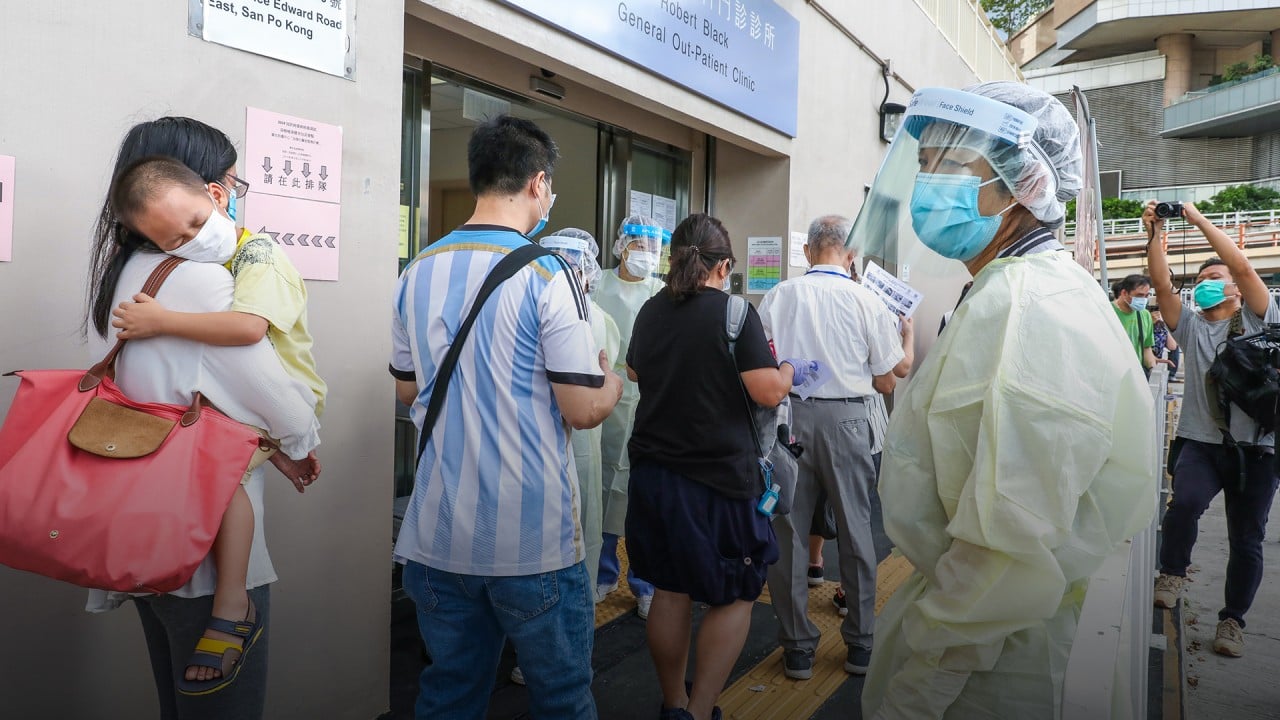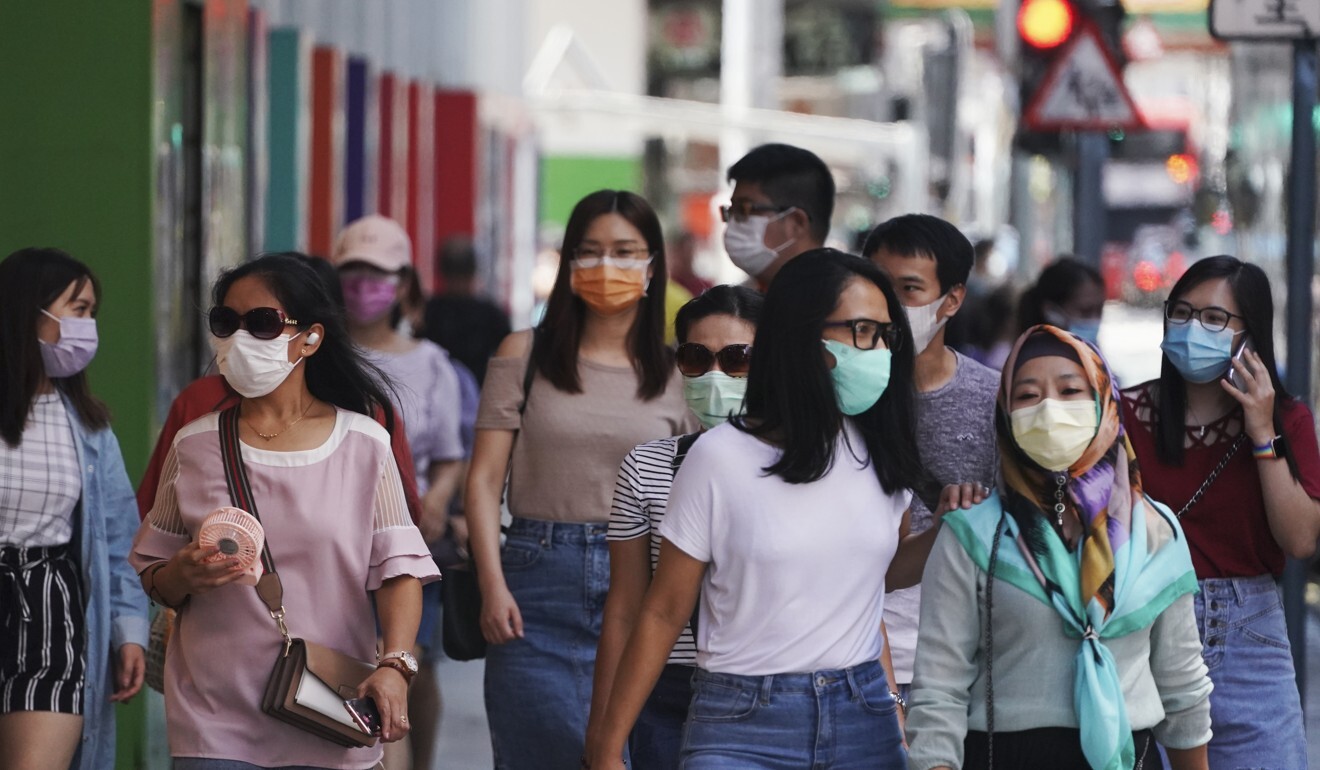
Hong Kong enters global race to secure coronavirus vaccine, as city leader vows to join testing scheme to spur public
- Government taking part in WHO programme that will pool resources, but also actively seeking out medical firms with potential, asking Beijing for help
- The revelation comes as 27 new infections were recorded on Friday, continuing a recent downward trend
Key points:
•Hong Kong has joined global efforts in securing Covid-19 vaccines, including being part of an international vaccine distribution programme and getting in touch with different drug makers
•Citywide voluntary coronavirus testing is set to begin on September 1. No participation target has been set by the government
•Top officials say implementing health code within city to confirm infection-free status is “unfeasible”, but this system would be used for travel in the future
•Social-distancing measures may be relaxed before the completion of citywide testing
•Domestic workers in an employment transition to get free Covid-19 tests at a designated location
While the numbers had come down recently after an alarming surge in daily cases, strict social-distancing measures will have to remain in force for now, she said.
“We hope everyone can remain patient, as the following week or days will be key to make clearer on a few things – whether there is a continued deteriorating infection trend, whether the two worrying clusters concerning domestic helpers and container port terminal workers can be tackled. We will then enter the phase to carry out community testing,” Lam said.
We are living in an abnormal social environment, in which whenever the government tries to do something, there will be people conspiring, smearing
Eight months into the city’s struggle against the pandemic, officials reported progress on the vaccine procurement front.
“We understand the virus will not be eliminated unless there is an effective vaccine. We have reserved resources to procure vaccines from companies that have potential,” said Professor Sophia Chan Siu-chee, the city’s health minister.
Chan said the government had adopted a two-pronged approach in procuring vaccines.
One was through joining global vaccine effort Covax Facility programme, which is jointly led by the World Health Organisation and two other platforms, Gavi and the Coalition for Epidemic Preparedness Innovations. Such a programme could secure vaccines for about 20 per cent of the city’s 7.5 million residents.

03:07
Hong Kong’s mass Covid-19 testing to begin on September 1, to last at least 7 days
The campaign has pooled funds from numerous countries to develop Covid-19 vaccines and distribute them equitably around the world. Governments joining the programme would be guaranteed access to successful vaccines.
The government was simultaneously looking at different companies worldwide in the hope of procuring vaccines in advance, and seeking Beijing’s help as well, Chan said.
Fewer than 10 vaccine candidates had currently entered phase-three clinical trials, the final testing stage before they could be made available for use, Chan said. Prices were fluctuating but the government had reserved funds already, she added.
Professor David Hui Shu-cheong, an adviser to the government on the pandemic response, expected the earliest batch of vaccines to be made available around the middle of next year.
Hong Kong schools to hold tests for cross-border students in Shenzhen
Under the universal testing scheme, residents aged above six without coronavirus symptoms will be eligible to register online. They will have to provide their name, ID card number and preferred time slot and swabbing station, where medical professionals will collect nose and throat samples for testing.
To address concerns about privacy and misuse of personal data, participants will be given a sample bottle with a bar code, and only the Department of Health will hold information about their identities.
Civil service chief Patrick Nip Tak-kuen gave a public reassurance that tests would only be conducted within the city and no personal data would be sent outside Hong Kong.
“We know the programme is voluntary, but we encourage the public to participate actively … so that we can cut off the transmission chain earlier,” he said. “For yourself, for your loved ones, for those hardworking medical workers, please participate.”

Responding to anti-mainland sentiment that has resulted in some suspicion over help coming from across the border, the city’s leader promised that she and her ministers would set an example by taking the tests themselves.
“Definitely. We will be the first to put ourselves through the universal testing. I can assure you of that,” Lam said, while admitting there might be “less incentive” for the public to join, given the improving infection figures.
“We do not have a target. I have to clarify the health minister was just mentioning a [5 million] capacity, instead of a target … especially as we are living in an abnormal social environment, in which whenever the government tries to do something, there will be people conspiring, smearing, trying to split up society,” she said.
Packed like sardines, no way to get home: Hong Kong helpers stuck amid pandemic
Domestic helpers would be tested before moving in with new employers, starting next week, he added.
If the situation improved further, the government might consider easing restrictions on nighttime dining at restaurants and allow a partial reopening of establishments such as beauty parlours and cinemas, Lam said.
Once the current third wave of infections was more under control, Lam said, the government would unveil a health code plan to enable cross-border travel. Such an arrangement would allow a QR code for travellers to show on their smartphones as certification of their health status.
In the near future, those seeking to travel would have to register online for a quota, before taking a coronavirus test from a recognised medical facility or laboratory.
Innovation and technology chief Alfred Sit Wing-hang said those who tested negative would get a Hong Kong health code, and could then apply to Guangdong or Macau authorities for a digital certificate for exemption from quarantine restrictions.
But Lam ruled out introducing a health code within Hong Kong specifically for restaurants and shops, saying such a plan would be “unfeasible” and unfair to the public. Some pro-establishment lawmakers had suggested that those taking part in the universal tests should get a health code to resume social activities.
Hong Kong mass Covid-19 testing set for September 1; detainee case sparks fears
Simon Wong Kit-lung, who runs more than 30 Chinese and Japanese restaurants, said health authorities were worried about the risk of cross-infection.
“We are willing to take more preventive measures as long as we can reopen dine-in services at night. Restaurants will improve air ventilation systems as well if that’s necessary,” he said.
Amy Hui Wai-fung, chairwoman of Hong Kong Beauty and Fitness Professional General Union, made a similar appeal for easing restrictions, saying: “We will use disposable items as much as possible. Staff will wear face shields and masks at work.”

Lam said the government had not taken on any view about waiting until the end of the universal testing programme before relaxing some social-distancing measures.
The issue had been raised in a special meeting of her de facto cabinet on Thursday, with sources who attended suggesting to the Post that measures would not be relaxed before the testing was completed as that would be “contradictory”.
Government adviser Hui said universal testing “would not be much use” if the number of the people joining the scheme fell short of the government’s expectations.
“If only some 1 million people participate in the scheme, the samples can’t represent the whole population. There could still be many invisible chains of infection that we can’t track,” he told a radio programme on Friday.
University of Hong Kong microbiologist Dr Ho Pak-leung said offering weekly testing for high-risk groups would be more effective in combating the virus, compared with citywide testing over two weeks.
He suggested highest priority should go to patients at public hospitals, frontline staff for the Hospital Authority, and care workers – which could take up around 15,000 tests a day.
“You have to aim at some targets, otherwise you are just wasting bullets,” he said.


